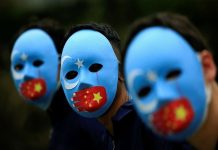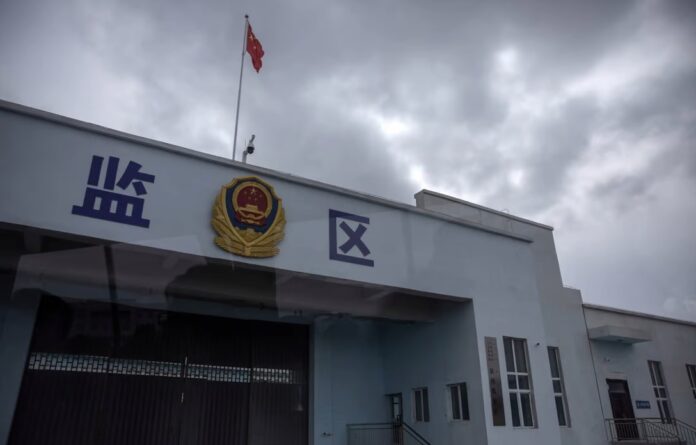Dozens of countries voiced concern Tuesday at alleged abuses in China’s Xinjiang region, and demanded that the UN rights chief publish a long-delayed report on the rights situation there.
“We continue to be gravely concerned about the human rights situation in Xinjiang Uygur autonomous region,” Paul Bekkers, the Dutch ambassador to the UN in Geneva, told the UN Human Rights Council.
Delivering a joint statement on behalf of 47 countries, he pointed to a number of “credible reports” – vehemently rejected by China – indicating that more than 1 million Uygurs and members of other Muslim minorities have been arbitrarily detained in the region.
“There are reports of ongoing widespread surveillance, discrimination against Uygurs and other persons belonging to minorities,” he said.
On behalf of 47 countries, the Kingdom of the Netherlands delivered a statement at the @UN_HRC expressing grave concerns about the human rights situation in #China, especially in #Xinjiang.
Read the joint statement here: https://t.co/iT2Vs5gEyC pic.twitter.com/q4p3epzsp4
— NL Mission in Geneva (@NLinGeneva) June 14, 2022
The joint statement also voiced concern about “reports of torture and other cruel, inhuman or degrading treatment or punishment, forced sterilisation, sexual and gender-based violence, forced labour, and forced separation of children from their parents by authorities”.
The countries, he said, “repeat our call on China to urgently address these concerns”, and to “end the arbitrary detention of Muslim Uygurs and persons belonging to other minorities”.
They also called on Beijing to provide UN investigators and experts “meaningful and unfettered access” to independently observe the situation on the ground.
UN High Commissioner for Human Rights Michelle Bachelet was granted access to visit last month – marking the first visit by a UN rights chief to China in 17 years.
But she faced harsh criticism for not speaking up more forcefully against China’s alleged abuses before and during the trip, which is believed to have been heavily controlled by Chinese authorities.
In Tuesday’s joint statement, the countries asked for “more detailed observations, including on the restrictions the Chinese authorities imposed on the visit”.
China’s ambassador Chen Xu reacted angrily to the joint statement, slamming the Netherlands and the other signatories for spreading “lies and rumours to attack China”.
“We categorically reject these allegations,” he said slamming the countries behind the statement for their “hypocrisy” and “attempts to engage in political manipulation”.
He hailed Bachelet’s visit, insisting it had “enhanced her understanding of China’s path of human rights development”.
The UN rights chief has also faced growing pressure to release a long-delayed report on the rights situation in Xinjiang, which diplomats say has been ready for months.
Bachelet, who announced on Monday that she will not be seeking a second term, vowed that the report would be published before she steps down on August 31.
Tuesday’s joint statement urged the report’s “prompt release”, asking Bachelet to provide “further information on the timeline”.
Dozens of countries voiced concern Tuesday at alleged abuses in China’s Xinjiang region, and demanded that the UN rights chief publish a long-delayed report on the rights situation there.
“We continue to be gravely concerned about the human rights situation in Xinjiang Uygur autonomous region,” Paul Bekkers, the Dutch ambassador to the UN in Geneva, told the UN Human Rights Council.
Delivering a joint statement on behalf of 47 countries, he pointed to a number of “credible reports” – vehemently rejected by China – indicating that more than 1 million Uygurs and members of other Muslim minorities have been arbitrarily detained in the region.
“There are reports of ongoing widespread surveillance, discrimination against Uygurs and other persons belonging to minorities,” he said.
On behalf of 47 countries, the Kingdom of the Netherlands delivered a statement at the @UN_HRC expressing grave concerns about the human rights situation in #China, especially in #Xinjiang.
Read the joint statement here: https://t.co/iT2Vs5gEyC pic.twitter.com/q4p3epzsp4
— NL Mission in Geneva (@NLinGeneva) June 14, 2022
The joint statement also voiced concern about “reports of torture and other cruel, inhuman or degrading treatment or punishment, forced sterilisation, sexual and gender-based violence, forced labour, and forced separation of children from their parents by authorities”.
The countries, he said, “repeat our call on China to urgently address these concerns”, and to “end the arbitrary detention of Muslim Uygurs and persons belonging to other minorities”.
They also called on Beijing to provide UN investigators and experts “meaningful and unfettered access” to independently observe the situation on the ground.
UN High Commissioner for Human Rights Michelle Bachelet was granted access to visit last month – marking the first visit by a UN rights chief to China in 17 years.
But she faced harsh criticism for not speaking up more forcefully against China’s alleged abuses before and during the trip, which is believed to have been heavily controlled by Chinese authorities.
In Tuesday’s joint statement, the countries asked for “more detailed observations, including on the restrictions the Chinese authorities imposed on the visit”.
China’s ambassador Chen Xu reacted angrily to the joint statement, slamming the Netherlands and the other signatories for spreading “lies and rumours to attack China”.
“We categorically reject these allegations,” he said slamming the countries behind the statement for their “hypocrisy” and “attempts to engage in political manipulation”.
He hailed Bachelet’s visit, insisting it had “enhanced her understanding of China’s path of human rights development”.
The UN rights chief has also faced growing pressure to release a long-delayed report on the rights situation in Xinjiang, which diplomats say has been ready for months.
Bachelet, who announced on Monday that she will not be seeking a second term, vowed that the report would be published before she steps down on August 31.
Tuesday’s joint statement urged the report’s “prompt release”, asking Bachelet to provide “further information on the timeline”.
Chen meanwhile decried the “hyped-up so-called report on Xinjiang”, pointing out that it had not been ordered by the rights council, alleging it violated Bachelet’s mandate and “should not be published at all”.
While a long line of countries that took the floor individually on Tuesday echoed the sentiments in the joint statement, a number also came to China’s defence, with Belarus, Cuba and North Korea also insisting the report should not be published.
Venezuela’s ambassador Hector Constant said the same, slamming “a sustained campaign of fake news against Xinjiang and China”.

































